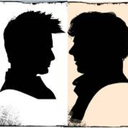
BBC Sherlock Fan Forum - Serving Sherlockians since February 2012.
- RavenMorganLeigh
- Official Blogger
 Offline
Offline 
- From: Seattle, WA, USA
- Registered: December 25, 2013
- Posts: 1,575
Re: The "new" Sherlock - emotions and all that
lindyhopper883 wrote:
I'm wondering if anyone else has noticed the change in point of view. Seasons 1&2 were from the pov of John, which follows the books. However TEH was about 1/2, 1/2 Sherlock/John and TSoF was almost completely from Sherlock's point of view.
We've been given a window into Sherlock's mind and how it works (his visualising himself on the train in E1 and his discussion with the 5 "ghost boyfriend" women.) Before, we only saw glimpses of Sherlock's deducing, nothing so detailed. It's given us additional insight into his relationship with his brother, who looks down at him and leads his thought process, and that The Woman is still in his head.
Maybe this "new Sherlock" is partially because we have more insight into his head as well.
Also just wondering what you all think about this switch in point of view.
I kept thinking that as well; it seemed to me that the previous episodes have been all about John's experience of Sherlock, VS Sherlock, himself.
- besleybean
- Threatened Knighthood
 Offline
Offline 
- From: Carnoustie, Angus, Scotland.
- Registered: October 4, 2012
- Posts: 21,380
Re: The "new" Sherlock - emotions and all that
Yes I hadn't really got that so well before, this was defiinitely all about Sherlock...
Last edited by besleybean (January 8, 2014 6:49 am)
---------------------------------------------------------------------------------------------------------------------------------------------------------------
- SusiGo
- The game is never over (moderator)
 Offline
Offline 
- From: Germany
- Registered: June 5, 2012
- Posts: 22,969
Re: The "new" Sherlock - emotions and all that
Very good point. I find the changed POV fascinating but I wonder if Sherlock's mind has always worked like that or if there has been a change. The intrusion of Mycroft into his mind as a sort of teacher/controlling instance was quite interesting. In the previous series I did not get the impression that Mycroft was so present in his mind even with regard to the fact that we saw him mostly from John' POV.
------------------------------
"To fake the death of one sibling may be regarded as a misfortune; to fake the death of both looks like carelessness." Oscar Wilde about Mycroft Holmes
"It is what it is says love." (Erich Fried)
“Enjoy the journey of life and not just the endgame. I’m also a great believer in treating others as you would like to be treated.” (Benedict Cumberbatch)

- •
- SolarSystem
- Threatened Knighthood
 Offline
Offline - From: Germany
- Registered: July 30, 2013
- Posts: 10,650
Re: The "new" Sherlock - emotions and all that
Wasn't sure where to put this, so I'll just put it here.
This little conversation on tumblr just made me go from ![]() to
to ![]() .
.
When Sherlock finally understands that being different doesn’t mean he has to be alone…
… He becomes alone.
And deaded.
alone and deaded in an egg chair sitty thing
This went from devastating to hilarious in .003 seconds
Last edited by SolarSystem (January 8, 2014 10:18 am)
___________________________________________________
"Am I the current King of England?
"I see no shame in having an unhealthy obsession with something." - David Tennant
"We did observe." - David Tennant in "Richard II"
- gently69
- One More Miracle
 Offline
Offline 
- From: Germany
- Registered: November 18, 2013
- Posts: 6,646
Re: The "new" Sherlock - emotions and all that
Ha ha, a good one. ![]()
-----------------------------------------------------------------------------------------------------------------------------------------------------------------------------------------------------
Ten:" I'm burning up a sun just to say goodbye."

Sherlock: "I heard you.”
"Temptation coursing through our veins "
(Tony Hadley)
- Umbrella
- Wrong!
 Offline
Offline - Registered: January 7, 2014
- Posts: 5
Re: The "new" Sherlock - emotions and all that
RavenMorganLeigh wrote:
silverblaze wrote:
RavenMorganLeigh wrote:
Emotionally shut down-- I think that's closer to it, I think it's a defense mechanism that, somehow, he's lost.
That's how I like to imagine him. And I want to ignore any characterisation that contradicts that.
Me, too!
To elaborate on that point; I have this wierd theory (based on some studies I've done as a counselor); I keep thinking that Sherlock is probably Highly Sensistive-- meaning it's all data, from every possible direction, all the time. It's too much, too loud, too hot, too cold, too...everything. Add to that being thought of as a freak for most of his life-- people like that can and will shut down emotionally, to the point of seeming robotic. They build behavioral mental walls to shield themselves from--too much. But Sherlock let John in, and I think the dam broke, and whatever he went through during the Hiatus broke him even more.
It's as if his mind palace is crumbling. (shudder!)
Of course, this is only my headcanon, but it's making me want to do some writing, so I'll sign off, now.
I agree with your theory, with intellectual giftedness comes High Sensitivity in almost all the cases. He totally thinks like a high iq, making links between ideas and situations constently and has difficulties to focus when there are people around or when he's not interested. He's always trying to keep control on his thoughts and emotions, which are always too much/not enough. And with great mind power comes low social skills.
- tonnaree
- The "B" is SILENT! (Mod)
 Offline
Offline 
- From: Atlanta, Georgia, USA
- Registered: May 31, 2013
- Posts: 9,270
Re: The "new" Sherlock - emotions and all that
"This went from devastating to hilarious in .003 seconds
Our fandom in a nutshell. And the reverse happens quite often too.
----------------------------------------------------------------------
Proud President and Founder of the OSAJ.
Honorary German
"Anyone who takes himself too seriously always runs the risk of looking ridiculous; anyone who can consistently laugh at himself does not".
-Vaclav Havel
"Life is full of wonder, Love is never wrong." Melissa Ethridge
I ship it harder than Mrs. Hudson.


- Mrs. Watson
- John's Army
 Offline
Offline 
- From: Chile (South America)
- Registered: August 6, 2013
- Posts: 267
Re: The "new" Sherlock - emotions and all that
SolarSystem wrote:
Right. When I first saw that scene I immediately thought 'Spock' - and John says it right then and there, Spock...
Well, that's only logical since Sherlock is Spock's ancestor ![]()


Gif by YouShouldHaveLetMeSleep
- RavenMorganLeigh
- Official Blogger
 Offline
Offline 
- From: Seattle, WA, USA
- Registered: December 25, 2013
- Posts: 1,575
Re: The "new" Sherlock - emotions and all that
Umbrella wrote:
RavenMorganLeigh wrote:
silverblaze wrote:
That's how I like to imagine him. And I want to ignore any characterisation that contradicts that.Me, too!
To elaborate on that point; I have this wierd theory (based on some studies I've done as a counselor); I keep thinking that Sherlock is probably Highly Sensistive-- meaning it's all data, from every possible direction, all the time. It's too much, too loud, too hot, too cold, too...everything. Add to that being thought of as a freak for most of his life-- people like that can and will shut down emotionally, to the point of seeming robotic. They build behavioral mental walls to shield themselves from--too much. But Sherlock let John in, and I think the dam broke, and whatever he went through during the Hiatus broke him even more.
It's as if his mind palace is crumbling. (shudder!)
Of course, this is only my headcanon, but it's making me want to do some writing, so I'll sign off, now.I agree with your theory, with intellectual giftedness comes High Sensitivity in almost all the cases. He totally thinks like a high iq, making links between ideas and situations constently and has difficulties to focus when there are people around or when he's not interested. He's always trying to keep control on his thoughts and emotions, which are always too much/not enough. And with great mind power comes low social skills.
The other thing with HSP's , one-- they sometimes get confuded with Autistics, or Aspergers'-- and if they were either emotionally abused-- or grew up with emotionally unavailable parents, they can shut down emotionally themselves as a defense mechanism.
After watching Dr. Elaine Aaron's talk (you can find it on youtube) on HSP's, you find something else-- a small percentage of them are thrill-seekers. What Aaron is actually talking about is Hypersensitivity. In other words, you ask Sherlock what he sees, and he says "EVERYTHING." I'm paraphrasing the Downey version, but I think it applies here, as well.
- silverblaze
- Official Blogger
 Offline
Offline - From: Netherlands
- Registered: December 4, 2013
- Posts: 1,353
Re: The "new" Sherlock - emotions and all that
In my headcanon it's actually Mycroft who is hypersensitive (and has a photographical memory and a super high iq). That's why he created a club where no one is allowed to talk, he gets overstimulated very quickly. And he loves being alone at Christmas. And he's way more emotionally shut down than Sherlock.
Sherlock has similar traits but in a milder version. When Mycroft tells Sherlock not to get involved, he's trying to protect him. That behaviour has worked for Myroft but Sherlock has different needs.
- Jacco111
- John's Army
 Offline
Offline 
- Registered: January 19, 2013
- Posts: 308
Re: The "new" Sherlock - emotions and all that
I can't remember Mycroft being described as 'hypersensitive'.
-------------------------------------------------------------------------------------------------------------
"The world is big enough for us, no ghosts need apply"
- silverblaze
- Official Blogger
 Offline
Offline - From: Netherlands
- Registered: December 4, 2013
- Posts: 1,353
Re: The "new" Sherlock - emotions and all that
No, that's why I said 'headcanon'. It's in my own imagination, trying to account for his unusual behaviour.
- Cleanshaven Doctor
- Shooting The Wall
 Offline
Offline - From: Germany
- Registered: January 11, 2014
- Posts: 14
Re: The "new" Sherlock - emotions and all that
I am not so sure that Sherlock really was as emotional as we are all supposed to think. I have the strange feeling that he used the wedding and the speech for his own purpose which is to find and eliminate CAM, even if he doesn't know yet exactly who he is. Sherlock already knows that there is something wrong with Mary. She told him she is an orphan yet the telegramm says "...wish your family could have seen that". And Mary is the one who received the messages about John being in danger in TEH. So Sherlock knows that John is in danger because of Mary.
May be Sherlock wants to challenge CAM and wants to make him believe that he, Sherlock, is most vulnerable when it comes to John and Mary. He lets CAM know that he cares about John and Mary. His vow at the end of the episode was not (or not only) a vow to John and Mary but (also) an invitation to CAM to the game. He uses John and Mary as a bait. His motivation hopefully is also to protect them in the end but he is surely eager to start the game.
Pretty dark, but more like Sherlock than him saying and meaning all those sweet things, much as I loved to hear them.
Four apples and three oranges....that's interesting.
- besleybean
- Threatened Knighthood
 Offline
Offline 
- From: Carnoustie, Angus, Scotland.
- Registered: October 4, 2012
- Posts: 21,380
Re: The "new" Sherlock - emotions and all that
Surely the definition of an orphan is that your family can no longer see something?!
Last edited by besleybean (January 11, 2014 8:47 am)
---------------------------------------------------------------------------------------------------------------------------------------------------------------
- Cleanshaven Doctor
- Shooting The Wall
 Offline
Offline - From: Germany
- Registered: January 11, 2014
- Posts: 14
Re: The "new" Sherlock - emotions and all that
Surely not. But when Sherlock mentions to Mary that her side of the church looks a bit thin she replies "Friends...that's what I have". Indicating -perhaps-that she has no family and suggesting (to me) that she never had one.
Last edited by Cleanshaven Doctor (January 11, 2014 9:07 am)
Four apples and three oranges....that's interesting.
- besleybean
- Threatened Knighthood
 Offline
Offline 
- From: Carnoustie, Angus, Scotland.
- Registered: October 4, 2012
- Posts: 21,380
Re: The "new" Sherlock - emotions and all that
Well she obviously had parents at some point. Ha!
I think peoeple would refer to their parents as ' family' and we don't know at what age she was orphaned.
Last edited by besleybean (January 11, 2014 9:14 am)
---------------------------------------------------------------------------------------------------------------------------------------------------------------
- SolarSystem
- Threatened Knighthood
 Offline
Offline - From: Germany
- Registered: July 30, 2013
- Posts: 10,650
Re: The "new" Sherlock - emotions and all that
At this point I would assume that her parents at one point died a violent death, maybe Mary doesn't even exactly know how they died.
___________________________________________________
"Am I the current King of England?
"I see no shame in having an unhealthy obsession with something." - David Tennant
"We did observe." - David Tennant in "Richard II"
- besleybean
- Threatened Knighthood
 Offline
Offline 
- From: Carnoustie, Angus, Scotland.
- Registered: October 4, 2012
- Posts: 21,380
Re: The "new" Sherlock - emotions and all that
Well yes, but point is, we don't know the details!
She could have been orphaned as a teenager, for all we know.
I mean I would suspect, under 7...but we don't know.
Possiby an age where she may just remember them.
Last edited by besleybean (January 11, 2014 11:13 am)
---------------------------------------------------------------------------------------------------------------------------------------------------------------
- Cleanshaven Doctor
- Shooting The Wall
 Offline
Offline - From: Germany
- Registered: January 11, 2014
- Posts: 14
Re: The "new" Sherlock - emotions and all that
So?
I am not saying that she has no family. I am saying that she wanted Sherlock to believe that she had no family.
Anyway, the family-thing is just one piece.
Last edited by Cleanshaven Doctor (January 11, 2014 9:29 am)
Four apples and three oranges....that's interesting.
- Mattlocked
- One More Miracle
 Offline
Offline 
- From: Germany
- Registered: June 29, 2012
- Posts: 6,781
Re: The "new" Sherlock - emotions and all that
Cleanshaven Doctor wrote:
I am not so sure that Sherlock really was as emotional as we are all supposed to think. I have the strange feeling that he used the wedding and the speech for his own purpose which is to find and eliminate CAM, even if he doesn't know yet exactly who he is. Sherlock already knows that there is something wrong with Mary. She told him she is an orphan yet the telegramm says "...wish your family could have seen that". And Mary is the one who received the messages about John being in danger in TEH. So Sherlock knows that John is in danger because of Mary.
May be Sherlock wants to challenge CAM and wants to make him believe that he, Sherlock, is most vulnerable when it comes to John and Mary. He lets CAM know that he cares about John and Mary. His vow at the end of the episode was not (or not only) a vow to John and Mary but (also) an invitation to CAM to the game. He uses John and Mary as a bait. His motivation hopefully is also to protect them in the end but he is surely eager to start the game.
Pretty dark, but more like Sherlock than him saying and meaning all those sweet things, much as I loved to hear them.
Very interesting; I think this might be a possibility. We will know more tomorrow night..... *sighs*
And for the orphan-thing I agree with besley: "... wish your family could have seen that." They can't anymore, because they are dead. Quite a common expression. ![]()
__________________________________
"After all this time?" "Always."
Good bye, Lord Rickman of the Alan

